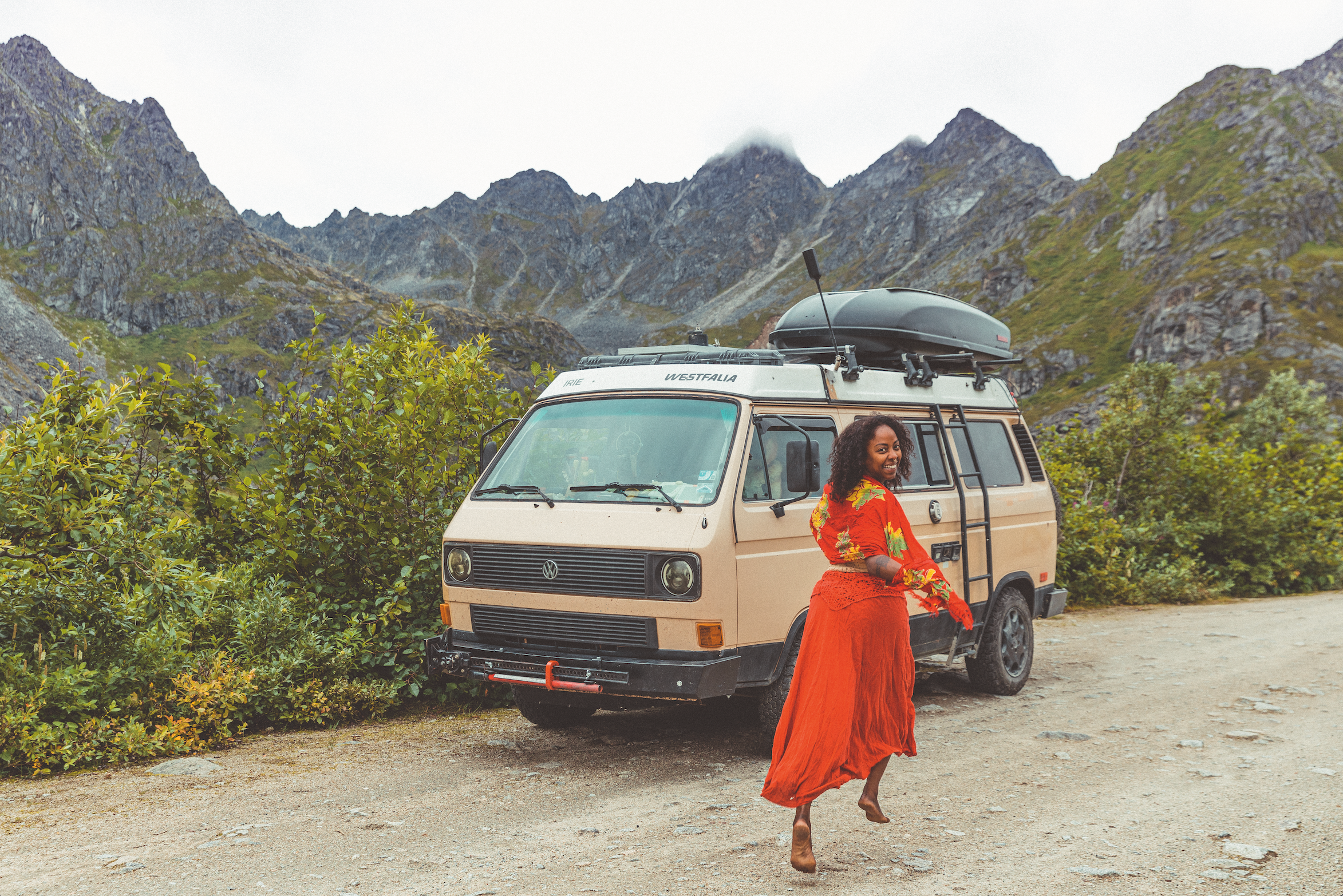
From the outside looking in, Noami Grevemberg had achieved the American dream. After growing up in Trinidad, she later moved to the United States to earn a bachelor’s degree in coastal science, eventually landing a job as an environmental scientist. Though she had a successful career, Grevemberg says she wasn’t happy with her long commute and the constant demands of the daily grind. On the weekends she and her husband found an escape from the mundanities of the rat race by camping and hiking near their hometown in New Orleans. In 2016, the couple decided to pursue a change of pace full-time, purchasing a 1985 VW Vanagon and documenting their travels on Instagram under the handle @irietoauroa – a reference to the name of their van and their mission to drive to Aurora, Alaska.
Along with documenting their travels on social media, Grevemberg shares the realities of being a Black nomad in her new book, Living the Vanlife, arriving on bookshelves on July 4. In it, she gives practical advice about earning an income, embracing minimalism, and handling relationships and intimacy while living in a van. Below, I caught up with Grevemberg to talk about all things van-dwelling, including the biggest lesson she’s learned in embracing this difficult lifestyle, how she does things like get her nails done, and what state her vehicle has taken her to that surprised her the most.
ESSENCE: You wrote that because you grew up in a remote village in Trinidad, your family was hesitant about your nomad lifestyle. What do they think now?
Noami Grevemberg: My mom actually came to visit in 2019, and I took her on a road trip to Arkansas National Park in the van. On the way back, she looked at me and said, “You know I really get it now. You can just keep going and never look back.” But one of the things that she told me was, “Well, I kind of grew up this way. I don’t really have an inkling to go back to it.” And that really hit me in a different way. I have a lot of BIPOC friends on the road whose parents also tell them the same thing.
Do you ever find yourself longing for a certain food or convenience when you’re on the road?
Absolutely. My relationship with material things has shifted a lot since living on the road. But when I crave something, I get it. If I want to go eat Nigerian food, I’ll go find a restaurant in the city somewhere. For me, living a simplistic life is about the things that bring me joy and the things that I value. So I don’t really deprive myself. I get my nails done sometimes. I get my hair done. When I’m achy and fatigued from the road and unable to focus or function, I have to take breaks, even if it’s one night in a hotel room with a king sized bed and a bathtub.

What state has surprised you the most during your travels across the United States?
Idaho surprised me with its landscape. I always thought of Idaho as just being about potatoes, but there are mountains, hot springs, rivers, and winding rivers. It’s just a magnificent state and really underrepresented and underestimated.
Do you have any tips for people who may have a limited budget or may not be able to travel full-time?
You can just start with what you have. When I first started out on the road, I was in a compact car and I took weekend trips to public lands, right in Louisiana. I would pack up everything I had in my kitchen, a cheap Walmart Ozark Trails tent, and my air mattress. I went camping on the weekends and that’s how I was able to slowly reconnect with my relationship with the outdoors.
What would you say has been your biggest life lesson so far on the road?
One of the biggest things that I realized when I started out on the road was that the world is in a big rush. Being on the road forced me to slow down. I had to let go and go with the flow. I was able to redirect my energy into figuring out what I needed to thrive in this world. And a big part of that had to do with realizing that before this, my entire life was always in a rush.
After recognizing the lack of diversity in the Vanlife community, you founded Diversify Vanlife to help others make the transition. How else do you hope to inspire the next generation of Black nomads?
I hope to inspire people to go after their dreams to think outside the box. We’re taught to live within these preconceived notions of who we should be as Black people and as Black women, and I hope to inspire people to break down those barriers and realize that we can be whatever we want to be and that we don’t have to live anyone’s construction of our existence.
What was the hardest and the most rewarding part of writing this book?
The hardest part for me was juggling traveling during a pandemic and writing this book. The public lands were closed down and I was trying to figure out how to take care of myself and also focus on my mental health so that I can have a creative flow for this book. The most rewarding part is having the opportunity to put my words in here and for other Black women and women of color on the road to read it.
What message do you want to leave with readers?
I want people to know that they get to choose the life that they want. I want people to realize that the power is already within them and joy and happiness are available to them at any point in their life.